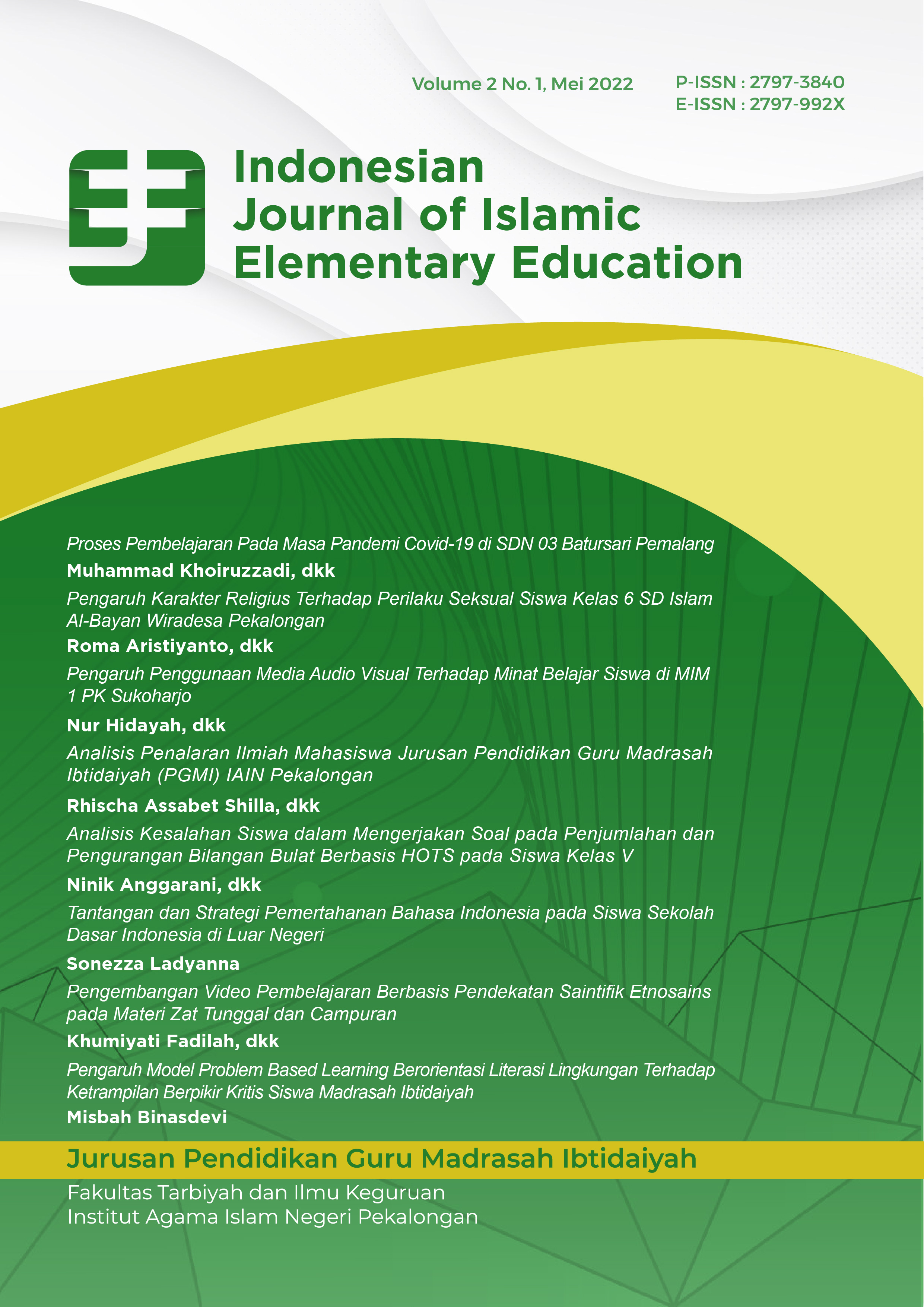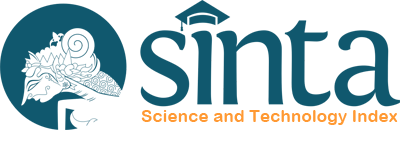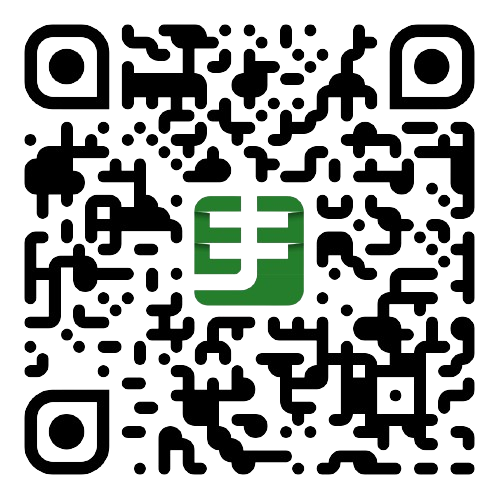Proses Pembelajaran pada Masa Pandemi Covid-19 di SDN 03 Batursari Pemalang
DOI:
https://doi.org/10.28918/ijiee.v2i1.4591Keywords:
Covid-19 pandemic, Online learning, Offline learningAbstract
This study aims to describe the learning process during the Covid-19 pandemic and the obstacles faced by teachers at SDN 03 Batursari Pemalang. This research is a field research using a qualitative approach. The subjects of this study were principals, teachers, students, and guardians of students at SDN 03 Batursari Pemalang. The results showed that learning during the Covid-19 pandemic used a combination of online and offline learning. Online learning by utilizing the WhatsApp group application as directed communication and to give assignments to students. In addition, the teacher also uses the youtube platform to explain the material and the google form is used to do assignments in the form of quizzes or description questions. Offline learning, commonly referred to as study groups, where learning is carried out face-to-face is limited while still paying attention to health protocols and an estimated maximum time of one hour of learning.
References
Anugrahana, A. (2020). Hambatan, Solusi dan Harapan: Pembelajaran Daring Selama Masa Pandemi Covid-19 Oleh Guru Sekolah Dasar. Scholaria: Jurnal Pendidikan Dan Kebudayaan, 10(3), 282–289. https://doi.org/10.24246/j.js.2020.v10.i3.p282-289
Bandura, A. (1977). Social learning theory. Prentice Hall.
Berk, L. E. (2012). Development Through The Lifespan. Pustaka Pelajar. Daryanto, & Mulyo, R. (2012). Model Pembelajaran Inovatif. Gava Media. Dimyati & Mudjiono. (2002). Belajar dan Pembelajaran. Rineka Cipta.
Emzir. (2014). Metode Penelitian Kualitatif: Analisis Data. PT Raja Gafindo Persada.
Fauzi, I., & Khusuma, I. H. S. (2020). Teachers’ Elementary School in Online Learning of COVID-19 Pandemic Conditions. Jurnal Iqra’ : Kajian Ilmu Pendidikan, 5(1), 58–70. https://doi.org/10.25217/ji.v5i1.914
Fine, M. J. (Ed.). (1989). The Second handbook on parent education: Contemporary perspectives. Academic Press.
Harahap, S. A., Dimyati, D., & Purwanta, E. (2021). Problematika Pembelajaran Daring dan Luring Anak Usia Dini bagi Guru dan Orang tua di Masa Pandemi Covid 19. Jurnal Obsesi : Jurnal Pendidikan Anak Usia Dini, 5(2), 1825–1836. https://doi.org/10.31004/obsesi.v5i2.1013
Hergenhanhn, B. R., & Olson, M. (2017). Theories Of Learning (VII). Kencana. Ibda, F. (2015). Perkembangan Kognitif. Jurnal Inetelektualita, 3(1), 27–38.
Khambali, K. (2017). Family Role in Shaping Character Islam in Early Childhood Through Habituation Method. Ta’dib : Jurnal Pendidikan Islam, 6(1), 155–163. https://doi.org/10.29313/tjpi.v6i1.2382
Khiyarusoleh, U. (2016). Konsep Dasar Perkembangan Kognitif Pada Anak Menurut Jean Piaget. Jurnal Dialektika Jurusan PGSD, 5(1), 1–10.
Khoiruzzadi, M., & Amalia, N. R. (2020). Pemanfaatan Lingkungan Alam Sebagai Sumber Belajar IPA Kelas 3 Sekolah Dasar (SD) Alam Ma’had Islam Pekalongan. JIP (Jurnal Ilmiah PGMI), 6(2), 215–235. https://doi.org/10.19109/jip.v6i2.5567
Khoiruzzadi, M., Barokah, M., & Kamila, A. (2020). Upaya Guru Dalam Memaksimalkan Perkembangan Kognitif, Sosial dan Motorik Anak Usia Dini. JECED : Journal of Early Childhood Education, 2(1), 40–51. https://doi.org/10.15642/jeced.v2i1.561
Khoiruzzadi, M., & Prasetya, T. (2021). Perkembangan Kognitif dan Implikasinya dalam Dunia Pendidikan: Madaniyah, 11(1), 1–14.
Oktawirawan, D. H. (2020). Faktor Pemicu Kecemasan Siswa dalam Melakukan Pembelajaran Daring di Masa Pandemi Covid-19. Jurnal Ilmiah Universitas Batanghari Jambi, 20(2), 541–544. https://doi.org/10.33087/jiubj.v20i2.932
Ola, L., J., & D, O., Anders. (2009). Online Learning Communities and Teacher Professional Development: Methods for Improved Education Delivery: Methods for Improved Education Delivery. IGI Global.
Powell, A., Watson, J., Staley, P., Patrick, S., Horn, M., Fetzer, L., Hibbard, L., Oglesby, J., & Verma, S. (2015). Blending Learning: The Evolution of Online and Face-to-Face Education from 2008-2015. Promising Practices in Blended and Online Learning Series. In International Association for K-12 Online Learning. International Association for K-12 Online Learning. https://eric.ed.gov/?id=ED560788
Pratama, R. E., & Mulyati, S. (2020). Pembelajaran Daring dan Luring pada Masa Pandemi Covid-19. Gagasan Pendidikan Indonesia, 1(2), 49–59. https://doi.org/10.30870/gpi.v1i2.9405
Setiawan, B., & Iasha, V. (2020). Covid-19 Pandemic: The Influence Of Full- Online Learning For Elementary School In Rural Areas. JPsd (Jurnal Pendidikan Sekolah Dasar), 6(2), 114–123. https://doi.org/10.30870/jpsd.v6i2.8400
Slade, A. (2007). Reflective Parenting Programs: Theory and Development. Psychoanalytic Inquiry, 26(4), 640–657. https://doi.org/10.1080/07351690701310698
Solso, R. L. (1991). Cognitive Pshycology. Allyn & Bacon.
Sugiyono. (2009). Metode Penelitian Kuantitatif Kualitatif dan R&D. Alfabeta.
Suparno, P. (2012). Teori Perkembangan Kognitif Jean Piaget. Penerbit Kanisius. Tresnani, L. D., & Khoiruzzadi, M. (2020). Program Pembiasaan Harian dalam
Membentuk Karakter Siswa Ditinjau dari Perspektif Psikologi Belajar. ISTIGHNA: Jurnal Pendidikan dan Pemikiran Islam, 3(1), 32–52. https://doi.org/10.33853/istighna.v3i1.42
Webb, M., & Whitmer, K. J. O. (2003). Parental religiosity, abuse history and maintenance of beliefs taught in the family. Mental Health, Religion & Culture, 6(3), 229–239. https://doi.org/10.1080/1367467021000038156
Yakob, M., Hidayat, M. T., Suciani, A., & Nucifera, P. (2020). Strategi Pencegahan Penularan Virus Covid-19 pada Sekolah Dasar. International Journal of Community Service Learning, 4(3), 209–214. https://doi.org/10.23887/ijcsl.v4i3.29095
Downloads
Published
Issue
Section
License
Copyright (c) 2022 Muhammad Khoiruzzadi, Budi Purnomo

This work is licensed under a Creative Commons Attribution 4.0 International License.
You are free to:
Share — copy and redistribute the material in any medium or format for any purpose, even commercially.
Adapt — remix, transform, and build upon the material for any purpose, even commercially.
The licensor cannot revoke these freedoms as long as you follow the license terms.
Under the following terms:
Attribution — You must give appropriate credit , provide a link to the license, and indicate if changes were made . You may do so in any reasonable manner, but not in any way that suggests the licensor endorses you or your use.
No additional restrictions — You may not apply legal terms or technological measures that legally restrict others from doing anything the license permits.
Notices:
You do not have to comply with the license for elements of the material in the public domain or where your use is permitted by an applicable exception or limitation .
No warranties are given. The license may not give you all of the permissions necessary for your intended use. For example, other rights such as publicity, privacy, or moral rights may limit how you use the material.














